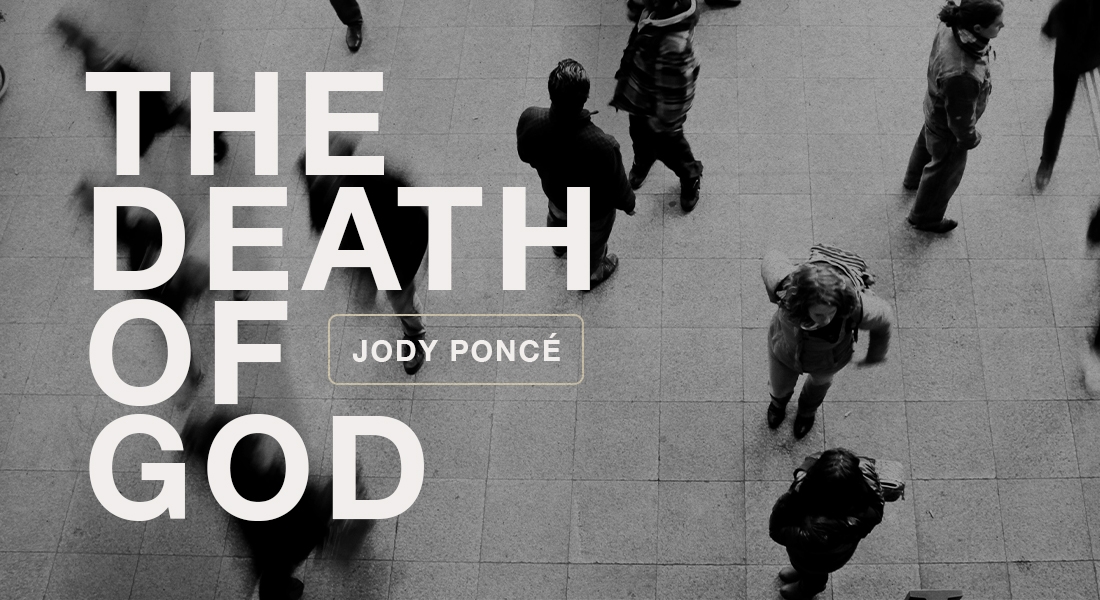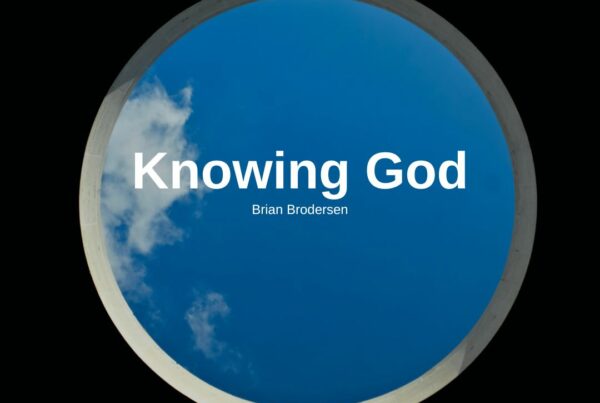
Perhaps many of you have, at some point in your lives, heard the famous quote by Fredrick Nietzsche: “God is dead; we have killed him.”
This quote comes from Nietzsche’s book, The Gay Science written in 1882. In it, Nietzsche tells a parable of a mad man who runs into the marketplace. The parable is relatively short, so I will include most of the text below:
Have you not heard of that madman who lit a lantern in the bright morning hours, ran to the marketplace, and cried incessantly: “I seek God! I seek God!” — As many of those who did not believe in God were standing around just then, he provoked much laughter. “Has he got lost?” asked one. “Did he lose his way like a child?” asked another. “Or is he hiding? Is he afraid of us? Has he gone on a voyage? emigrated?” — Thus they yelled and laughed.
The madman jumped into their midst and pierced them with his eyes. “Whither is God?” he cried; “I will tell you. We have killed him — you and I. All of us are his murderers. But how did we do this? How could we drink up the sea? Who gave us the sponge to wipe away the entire horizon? What were we doing when we unchained this earth from its sun? Whither is it moving now? Whither are we moving? Away from all suns? Are we not plunging continually? Backward, sideward, forward, in all directions? Is there still any up or down? Are we not straying, as through an infinite nothing? Do we not feel the breath of empty space? Has it not become colder? Do we not need to light lanterns in the morning?
How shall we comfort ourselves, the murderers of all murderers?”
Here the madman fell silent and looked again at his listeners; and they, too, were silent and stared at him in astonishment. “I have come too early,” he said then; “My time is not yet. This tremendous event is still on its way, still wandering; it has not yet reached the ears of men. Lightning and thunder require time; the light of the stars requires time; deeds, though done, still require time to be seen and heard. This deed is still more distant from them than most distant stars — and yet they have done it themselves.”
On the same day the madman forced his way into several churches and he said, “What after all are these churches now if they are not the tombs and sepulchers of God?”
– The Gay Science, Fredrick Nietzsche
This story takes my breath away. I’m not sure if it is wonder at the prophetic accuracy of this story, or the fear of the nihilism it foreshadows, or the recognition I feel as I look out into the world, and realise, I am living in the future foretold by Nietzsche. Indeed, if the madman ran out into the “marketplace” today and declared, “God is dead. God remains dead. And we have killed him.” Everyone would already acknowledge the truth of it.
NIETZSCHE REALISED, BEFORE MANY OTHERS, THE COMING OF THE SECULAR AGE.
He saw how God would one day become irrelevant in the “marketplace,” which is a metaphor for the public sphere as well as the capitalist market. We now live in the secular age. Both religious and non-religious people live within this secular age. Even though there are still many believers, the age we live in is secular; the waters we swim in are secular, and the overarching narrative of the world is secular.
In this story, the madman realises what happens when God is removed from society. He understands that, without God, there is no light to light our path; that is why he “lit a lantern in the bright morning hours,” because, without the light of God, even the “bright morning hours” are thrown into darkness. He saw how a future with no story, no through-arch, and no purpose would descend into total nihilism, as the meaninglessness of existence and the universe became ever clearer. He writes:
“Are we not plunging continually? Backward, sideward, forward, in all directions? Is there still any up or down? Are we not straying, as through an infinite nothing? Do we not feel the breath of empty space? Has it not become colder? Is not night continually closing in on us?”
Without God, meaninglessness is all we have to turn to. Nietzsche perhaps harboured some hope that humans would be able to one day write their own story, to find a way to infuse existence with some meaning, but the world is churning, “plunging continually,” totally devoid of something worth living for. The secular thesis has failed; we have not managed to write a story of peace and love, instead, we have written a story of distraction.
DISTRACTION IS THE WORD FOR THE SECULAR AGE.
All of our technological development and our hubristic murder of God has not lead to a secular utopia, instead, it has led to the construction of a web of distraction; so thorough that, we no longer have to face the meaninglessness of life and existence. We can just switch on Netflix, or social media, or Disney+, or any other infinite number of technological distractions that blind us to the emptiness of life. We can wash it all away by binge watching Cobra Kai.
We have done all this, murdered God and built a world filled with emptiness and distraction, all with an inflated sense of our own cleverness. We scoff at those silly people who still believe in fairy tales like God. When the madman enters the marketplace, he shouts:
“‘I seek God! I seek God!’ — As many of those who did not believe in God were standing around just then, he provoked much laughter. ‘Has he got lost?’ asked one. ‘Did he lose his way like a child?’ asked another. ‘Or is he hiding? Is he afraid of us? Has he gone on a voyage? emigrated?’ — Thus they yelled and laughed.”
Those who seek God have been scoffed at, and those who have dismissed his existence have felt progressively more clever. But, that is only because they do not look into the abyss. Nietzsche also said, “If you gaze long enough into the abyss, the abyss will gaze back into you.” Few secular people today take much time to consider the ramifications of the meaning of a life without God. It means that all of life and existence is one big accident, and that one day it will all end in a heat death; none of it will have mattered, and nothing will be remembered because there is nothing out there. This is the abyss that people do not look at, because if you look at it long enough, it will look back into you; and the enormity of it will be too much.
Even though we are experts at distracting ourselves, on some level, the reality of “meaninglessness” remains, and the “lack of a story” to explain our existence and give our lives purpose, still presses in. It manifests in crippling anxiety and epidemic narcissism. We have not freed ourselves from the bonds of religion; we have bound ourselves to meaninglessness. In place of a loving God, who has a story for each of us, resides emptiness.
THE WONDERFUL STORY OF THE GOSPEL GIVES PURPOSE AND MEANING TO OUR UNIVERSE AND TO OUR LIVES.
We do not have to face the abyss alone, in fact, the abyss is filled up with God. He is the creator and sustainer of the universe. He is the one who turns ashes to beauty, even in all the broken parts of our story. He infuses us with purpose and fills our eternity with hope. He wipes every tear from our eyes and ensures that every pain we’ve suffered and every tragedy we’ve endured will be remembered and turned into something beautiful in his eternal plan. With God, it will not all end in a heat death, and humanity will endure in the loving grip of Christ.
Nietzsche ends his parable with a stark prediction; he writes of the empty churches that remain after the death of God, “What after all are these churches now if they are not the tombs and sepulchers of God?” I take this as a challenge to the church in 2021. God’s not dead; he is very much alive and working. But have we made our great story, the story of the Gospel of Jesus Christ so amenable to this secular age, so palatable, so relevant, so secular that our churches resemble sepulchers of God?
The coronavirus has forced humanity to stare at the abyss en masse, in a way that has not occurred in many generations. People are afraid; they are aware of their mortality, and they are lonely, and isolated, and depressed. People are still shouting, “I seek God; I seek God.” The world still laughs at this cry, but let us hope the church still stands with the answer, “God is here.”
Do we still have God to offer those who seek him? The world needs the Gospel to bring God’s love, and comfort, and healing, and strength into their broken and fear-filled places. “How shall we comfort ourselves,” cry the people in the story. The church has the answer to that cry in the age old story of the cross, as true and as needed today as on the day Jesus died. Is the church of God still alive with the gospel? Do we still believe in the power of God to break chains and set the captives free, to save the lost?
God has you in the palm of his hand. He knows you. He loves you. You are not alone. God has a plan for you; God holds your eternity in his hands. Nothing can separate you from the love of God. Oh, what a great comfort these truths are to me. The world is crying out for this comfort, to know the God who made them. Though we have tried to kill, both God, and our personal need for God, neither attempt has succeeded. People feel their need for God through this pandemic in new and raw ways that all the distraction cannot hide; let’s be there to offer them the truth of the Gospel and not keep this great comfort to ourselves: It is for everyone.
Notes:
. Nietzsche, Friedrich. Beyond Good and Evil. Dover Publications, 1998.
. Nietzsche, Friedrich Wilhelm, 1844-1900. The Gay Science; with a Prelude in Rhymes and an Appendix of Songs. New York: Vintage Books, 1974.






